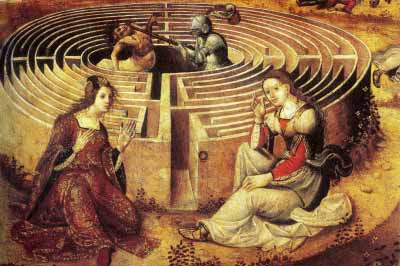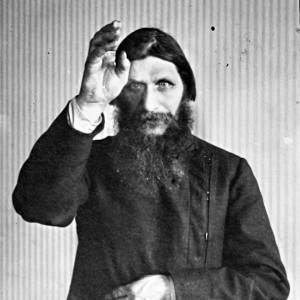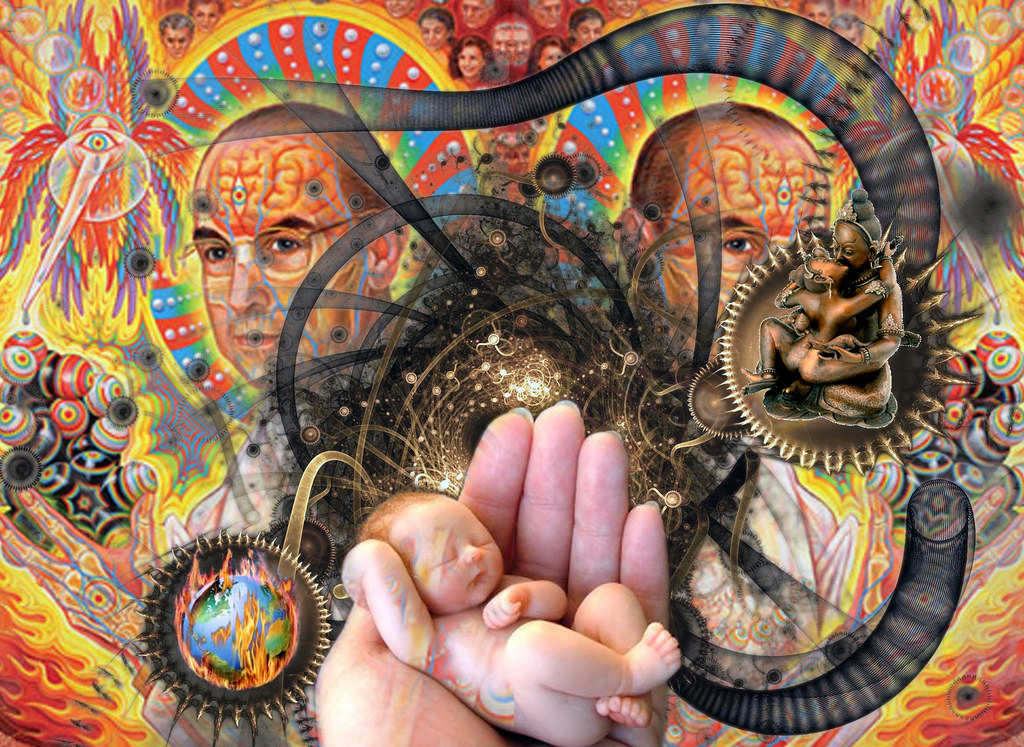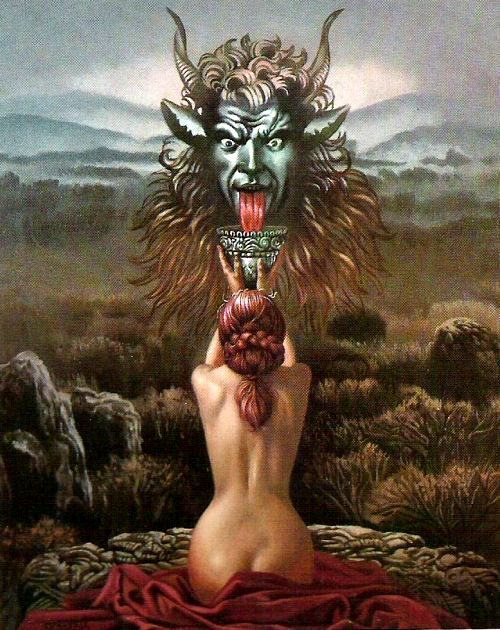Additionally, you may want to read my previous post on the Elthos Alignment System as well, as this explains the basis of some of my comments to follow... Ok, here we go...
I really admire Pundit's concept. It contains a number of really great insights and it raises truly fascinating questions. Here are my thoughts on it.
 One is that I don't think every Gnosis is produced necessarily by what I would call a "Shock". Some events, like Satori, are simply an experience of Enlightenment, and so calling them a "Shock" would not necessarily reflect the nature of the experience, which may be more like a sudden awakening to truth than what we think of as a "shock" (ie - a harmful jolt). I'm not sure what word to use that would cover both extremes ... Illumination might work, as it suggests throwing light on something. Sometimes it can be shocking, sometimes it might be revealing. So I can see an Axis of the impact of Illuminating experiences. When Pundit uses the word "Shock" by the way, he means that it jolts you out of "normal" consciousness. My objection is that exiting "normal" consciousness is not always best described as a "shock" though it certainly can be. I prefer something more of an umbrella term. Illumination may be better for me.
One is that I don't think every Gnosis is produced necessarily by what I would call a "Shock". Some events, like Satori, are simply an experience of Enlightenment, and so calling them a "Shock" would not necessarily reflect the nature of the experience, which may be more like a sudden awakening to truth than what we think of as a "shock" (ie - a harmful jolt). I'm not sure what word to use that would cover both extremes ... Illumination might work, as it suggests throwing light on something. Sometimes it can be shocking, sometimes it might be revealing. So I can see an Axis of the impact of Illuminating experiences. When Pundit uses the word "Shock" by the way, he means that it jolts you out of "normal" consciousness. My objection is that exiting "normal" consciousness is not always best described as a "shock" though it certainly can be. I prefer something more of an umbrella term. Illumination may be better for me.Another distinction I’d like to draw is that I don’t think that Gnosis only comes from the Illuminating ‘shocks’ or ‘satori’. It was said by Jesus that “unless ye become like these little children, ye shall in no way find the Kingdom of Heaven.” My feeling is this is an allusion to the idea that children, infants in particular, are born into a state of Awareness that gets diminished over time. The Quest for Gnosis is the Quest to find what one has lost, and no longer can remember. So in that sense I question the proposition that Gnosis is a product of “Shocks” but rather I wonder if the “Shocks” don’t actually work the other way – they are the ‘Hard Knocks” of life that eventually whittle away Gnosis, and so by the time you are a rational young person who goes to school and does their homework on time, you’ve significantly lost touch with the Mystical / Spiritual Universe. So I’m kind of tossing that around in my head as well. It seems to fit in with my thoughts regarding the use of the word “Illumination” for events that cause Gnosis. “Shocks” might be considered as events that diminish Gnosis and produce Ego, instead. Still tooling, but that seems like it might work for me.
Another thought that this brings to mind is that I think there is a conflation in Pundit's analysis between the Spiritual and the Magical impulses. I might prefer to separate those two. To my mind the Spiritual path is related to the quest for Enlightenment. On the other hand, while Magicians may wish to seek "Oneness with the Universe", for them the problem may be one of over-adherence to the Ego, and hence perhaps the Magician is really seeking Power, not Enlightenment.
In my original Elthos Rules system (prior to the ODS), I had a distinction between these two in the realm of mysticism, in so far as there is a mystical energy called Mana. This can either be aligned (by a God, aka Elkron), or unaligned, requiring the will of a Magician to shape it into a useful form. Clerics are those who draw on the Aligned Mana of their Deity, while Magicians are those who use their Ego to align Mana into a form themselves. In every case, it requires an Ego to Align (or shape) the Mana into a useful form. So for my concept I'd be likely to want to separate the quest for Enlightenment (Gnosis) from the quest for Power (Ego), and this would be the fundamental distinction between the Spiritual and Magical paths. As such Clerics would be trying to subdue their Ego in a drive towards Gnosis, while a Magician would be trying to enhance their Power by augmenting their Ego, with a disregard for "whatever Gnosis might be". Not that I would, as GM, sit in judgement ... both have their uses, and both are necessary in the Universe. After all, even the Gods have Ego, and without Ego there would be no development of civilization, no social interaction, and basically nothing much of interest at the finite level of existence. Then again, it also clearly causes problems as well. But that's the nature of life, and those conflicts are a natural by product of distinction to begin with, and without it we would, as beings, not have the opportunity to surpass our current state, learn anything, and evolve. So in my view, both Gnosis and Ego are imperatives of the Universal Order.
So from a system point of view I am thinking of the following based on Pundit's insights, but with my own slant on it.
Awareness (Gnosis --- Ego)
Rationality (Sanity --- Psychosis)
Compulsion, for example, would be one of any number of possible effects of psychosis. Other possible effects could be hallucinations, delusions, and/or schizophrenia. (As an aside I should say that these would be very interesting to Gamesmaster. Would you tell the Player "Your Character begins to suffer from psychosis"? I think I would rather play it out ... so I explain the Character sees such and such white rabbit on the window sill with a red ribbon and red pupils and it stares at him and then hops away. The Player wouldn't necessarily know if the Character is suffering hallucinations, or if the rabbit is some mystical totem he's been obsessing over meeting. The possiblities are endless, and rather amusing, so long as it is handled well. And of course, that utterly depends on the style of campaign, the genre, and many other factors besides.)
On the Sanity side I agree with the idea that Pundit puts forward that to be a socially successful person you need to have Sanity. People who are in a state of Gnosis, but have no grounding in reality, wind up being, from the point of view of everyone else, weird, incomprehensible and ultimately unapproachable. And yet Society needs people who have achieved Gnosis in order to learn what to aspire towards. Concepts of Peace, Justice, Goodness and Compassion all come from those who had once upon a time achieved Gnosis, and Society owes an everlasting debt to them. Otherwise we would still be living with The Law of the Jungle, wherein only Might Makes Right, and that would, in a word, suck.
I think for this system I might consider having 0 as the center point, and positive and negative values on each end of each axis, lets say 10 to -10. So with this in mind I could give a Character a value such as (2, -2) which would suggest a Liberated level of Gnosis, yet a falling into some kind of mild form of psychosis (a tendency towards Obsession, for example, would certainly do).
Such a system would parallel my Elthos Alignment System and make it easier for me to integrate into my existing game rules. It also strikes me as a somewhat simpler framework than what Pundit suggests in that I would have fewer variables to account for and maintain, but would not necessarily lose any of the flexibility of his design, nor its basic fundamental insights.
In the modified framework, the pursuit of Magic would suggest a trip down the Ego Axis, while Clerics would be heading towards Gnosis and ultimately Enlightenment should they get so far. To my mind this division makes a certain amount of sense, although I admit, it is certainly debatable. Pundit may completely disagree.
 That said, we should note that my suggestion would be in direct contraction to the Magician's conception of himself as someone who is seeking "Oneness with the Universe". To this one might say that the Magician is living in the Illusion of self-justification, which would fit in neatly with Pundit's comments about the consequences of ultimate Ego. The Magician thinks he has embarked on the path of Enlightenment, but this is simply an Ego-Delusion. He is really in pursuit of the Will to Power, and his "True Will" is the endpoint of that goal. This could be contrasted with the Cleric (of whatever religion) who is seeking to subsume himself in the "Oneness" of his God, and whose goal is not "True Will", but "True Self", which sounds the similar, but isn't quite the same. That "True Self", ultimately, is God, and by this the Cleric seeks to unite with God and thus, "do God's will", not his own.
That said, we should note that my suggestion would be in direct contraction to the Magician's conception of himself as someone who is seeking "Oneness with the Universe". To this one might say that the Magician is living in the Illusion of self-justification, which would fit in neatly with Pundit's comments about the consequences of ultimate Ego. The Magician thinks he has embarked on the path of Enlightenment, but this is simply an Ego-Delusion. He is really in pursuit of the Will to Power, and his "True Will" is the endpoint of that goal. This could be contrasted with the Cleric (of whatever religion) who is seeking to subsume himself in the "Oneness" of his God, and whose goal is not "True Will", but "True Self", which sounds the similar, but isn't quite the same. That "True Self", ultimately, is God, and by this the Cleric seeks to unite with God and thus, "do God's will", not his own. This raises another interesting issue… one could argue that by pursuing a Pantheistic religious path down a particular Alignment path (where ultimately the various Elkron of each Alignment resides) one is not getting any closer to Oneness either. Philosophically, I would say this is quite likely true. The answer to this may be that all of the Elkron of the 16 Alignments are really only partial reflections of The One True God, who embodies all of these things in the Great Oneness that is All. So Clerics in the end will either become “One” with a particular Alignment’s Elkron, or perhaps they will truly make the leap towards Universal Truth and find Enlightenment itself, which is Oneness with All.
But what about Good and Evil Clerics? This also needs to be reflected on. We have Evil Alignments, and Evil Elkron, do we not? There so there are those Clerics who want to unite with an Evil Deity, perhaps out of the anguish of their personal pain and a hope for revenge against those who they feel wronged them, or because they believe that True Power is to be found there, and so their Will to Power may compel them in that direction. Or perhaps the Evil Clerics are those who have fallen off the True Path, failed to "Cross the Abyss", and have consequently fallen prey to their "Black Brother" within, and thus have marched far down the path of both Psychosis and Ego. It makes me think there may be a one to one correlation between the Alignment Grid and the Mystic Disposition Grid. Possibly, possibly. I'm not sure. I will have to think about that more. If so, and they overlap, then maybe there is no need for two separate systems, but I can incorporate both concepts into one system. Perhaps.
Lastly, what are we to say of those who are not mystical at all? Those who perhaps have a relatively normal existence, who do not rise above the common lot? I would place them toward the center of the grid, hovering around the 0, 0 region of the chart. While we can understand them not achieving Gnosis, nor falling headlong into Ego, nor Psychosis, why do they not achieve Sanity? Because perhaps real Sanity, ultimately, requires a deep level insight, and a certain amount of Gnosis is required for that. The rest of us, as it happens, are simply normal. Some good, some bad, some understanding, but still caught up in our egos. Sometimes sane, sometimes not so sane.
Anyway, all of that said, I want to compliment Pundit and say thank you for some really wonderful writings on this topic. It’s really thought provoking, and who knows? Maybe I will derive an adjunct system for Mystical Evolution out of it, or fuse one into my existing system.
Much more tooling required, though, of course. But still, I feel there are good seeds here to cultivate. So once again, Pundit, thanks! Great stuff! :)
And now, to reflect on all of this ...



No comments:
Post a Comment